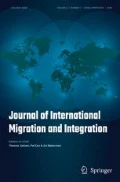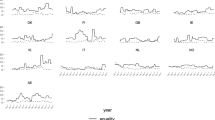Abstract
The African-born population in the United States is now the immigrant group growing at the fastest rate, yet African immigrants are often overlooked in studies of immigrant incorporation and social adjustment. One factor negatively impacting immigrant adjustment is a lack of congruence between pre-migration expectations and post-migration realities. Existing academic literature on this topic largely overlooks African immigrants with the exception of refugees, and current studies of Liberians in the United States also focus overwhelmingly on refugees. This article reorients the discussion of African immigrant incorporation by exploring such issues with a sample of Liberian immigrants in the Pittsburgh metropolitan area who arrived with a range of visa types. Using the results of five focus groups (N = 31), I outline shared unrealistic expectations of abundant wealth and development, an easier life, and Americans having extensive knowledge about Africa. I also examine often unanticipated challenges such as communication issues, negative interactions (including racism and African origin prejudice), cultural differences, problems finding jobs and adjusting to American work culture, and high expectations from home, including remittances. The results suggest that non-refugee immigrants face many of the same challenges as refugees and can benefit from information and resources fostering more successful integration.
Similar content being viewed by others
Notes
Bernadette Ludwig does recognize that there is a great diversity of visa types within the Liberian immigrant community; however, her article focuses specifically on refugees and people’s engagement with “refugee” as a concept and category.
Some participants chose multiple ethnic groups (Table 1).
References
Bakewell, O. (2008). Research beyond the categories: the importance of policy irrelevant research into forced migration. The Journal of Refugee Studies, 21(4), 432–453.
Baptiste, D., Jr., Hardy, K., & Lewis, L. (1997). Family therapy with English Caribbean immigrant families in the United States: issues of emigration, immigration, culture, and race. Contemporary Family Therapy, 19(3), 337–359.
Bates College Department of Anthropology (2008). Perceived barriers to Somali immigrant employment in Lewiston. A supplement to Maine’s Department of Labor Report. http://abacus.bates.edu/pix/PerceivedBarriers09Jan20.pdf.
Belanger, M. (2014). City officials: More than half of Pittsburgh’s paved roads have worst condition rating possible. http://www.wtae.com/news/city-officials-more-than-half-of-pittsburghs-paved-roads-have-worst-condition-rating-possible/25288386.
Bernard, W. S. (1976). Immigrants and refugees: their similarities, differences, and needs. International Migration, 14(4), 267–281.
Bernard, R. (2000). Social research methods: qualitative and quantitative approaches. Thousand Oaks: Sage Publications.
Berry, J. W., Kim, U., Minde, T., & Mok, D. (1987). Comparative studies of acculturative stress. International Migration Review, 21(3), 491–511.
Besteman, C. (2016). Making refuge: Somali Bantu Refugees and Lewiston, Maine. Durham: Duke University Press.
Bhattacharya, G., & Schoppelrey, S. (2004). Preimmigration beliefs of life success, postimmigration experiences, and acculturative stress: South Asian Immigrants in the United States. Journal of Immigrant Health, 6(2), 83–92.
Bhui, K., Abdi, A., Abdi, M., Pereira, S., Dualeh, M., Robertson, D., Sathyamoorthy, G., & Ismail, H. (2003). Traumatic events, migration characteristics and psychiatric symptoms among Somali refugees. Social Psychiatry Psychiatric Epidemiology, 38, 35–43.
Bobkoff, D. (2010). From steel to tech: Pittsburgh transforms itself. http://www.npr.org/2010/12/16/131907405/from-steel-to-tech-pittsburgh-transforms-itself.
Brown, H. E. (2011). Refugees, rights, and race: how legal status shapes Liberian immigrants’ relationship with the state. Social Problems, 58(1), 144–163.
Capps, R., McCabe, K., & Fix, M. (2012). Diverse streams: African migration to the United States. Washington, D.C: Migration Policy Institute.
CIA World Factbook, Liberia, https://www.cia.gov/library/Publications/the-world-factbook/geos/li.html. Accessed 20 Jan 2017.
Covington-Ward, Y. (2017). African immigrants in low-wage direct health care: motivations, job satisfaction, and occupational mobility. Journal of Immigrant and Minority Health. doi:10.1007/s10903-016-0400-8.
Covington-Ward, Y., Dennis, S., Reding, K., Simpson, A., & Willison, M. (2011). The socio-demographic characteristics of recent Liberian immigrants to the United States: an update. Liberian Studies Journal, 36(1), 25–52.
Creese, G., & Wiebe, B. (2012). Survival employment: gender and deskilling among African immigrants in Canada. International Migration, 50(5), 56–76.
Danso, R. (2002). From ‘There’ to ‘Here’: an investigation of the initial settlement experiences of Ethiopian and Somali refugees in Toronto. GeoJournal, 56(1), 3–14.
Dolo, E., & Gilgun, J. E. (2002). Gender-linked status changes among Liberian refugees in the United States. Journal of Social Work Research and Evaluation, 3(2), 203–213.
Elo, I., Frankenberg, E., Gansey, R., & Thomas, D. (2015). Africans in the American Labor Market. Demography, 52(5), 1513–1542.
Fischer, N. (2011). Pre- and post-migration attitudes among Ghanaian international students living in the United States: a study of acculturation and psychological well-being. PhD dissertation, Virginia Commonwealth University.
Fozdar, F. (2009). The Golden Country: ex-Yugoslav and African refugee experiences of settlement and depression. Journal of Ethnic and Migration Studies, 35(8), 1335–1352.
Gluszek, A., & Dovidio, J. (2010). Speaking with a nonnative accent: perceptions of bias, communication difficulties, and belonging in the United States. Journal of Language and Social Psychology, 29(2), 224–234.
Halcon, L. L., Robertson, C., Savik, K., Johnson, D., Spring, M., Butcher, J., Westermeyer, J., & Jaranson, J. (2004). Trauma and coping in Somali and Oromo Refugee Youth. Journal of Adolescent Health, 35(1), 17–25.
Hayden, B. (2006). What’s in a name? The nature of the individual in refugee studies. The Journal of Refugee Studies, 19(4), 471–487.
Hein, J. (1993). Refugees, immigrants, and the state. Annual Review of Sociology, 19(1), 43–59.
Iversen, V. C., Berg, J. E., & Vaaler, A. E. (2010). Expectations of the future: immigrant, asylum seeker, or refugee—does it matter? Journal of Psychiatric Intensive Care, 6(1), 23–30.
Kolozsvari, O. (2012). As long as you work hard, you can achieve your goals: Hungarian immigrants on the American Dream. Sociation Today, 10(1). http://www.ncsociology.org/sociationtoday/v101/dream.htm.
Ludwig, B. (2013). “Wiping the refugee dust from my feet”: advantages and burdens of refugee status and the refugee label. International Migration, 54(1), 5–18.
Moore, A. (2013). The American dream through the eyes of Black African immigrants in Texas. University Press of America.
Murphy, E., & Mahalingam, R. (2006). Perceived congruence between expectations and outcomes: implications for mental health among Caribbean immigrants. American Journal of Orthopsychiatry, 76(1), 120–127.
Negy, C., Schwartz, S., & Reig-Ferrer, A. (2009). Violated expectations and acculturative stress among U.S. Hispanic immigrants. Cultural Diversity and Ethnic Minority Psychology, 15(3), 255–264.
Nowak, D., & Greenfield, E. (2012). Tree and impervious cover change in U.S. cities. Urban Forestry and Urban Greening, 11, 21–30.
Okonofua, B. A. (2013). “I Am Blacker Than You”: theorizing conflict between African immigrants and African Americans in the United States. SAGE Open Vol 3, Issue 3.
Polzer, T., & Hammond, L. (2008). Invisible displacement. The Journal of Refugee Studies, 21(4), 417–431.
Portes, A., & Zhou, M. (1993). The new second generation: segmented assimilation and its variants. Annals of the American Academy of Political and Social Sciences, 530, 74–96.
Rodgers, D. T. (2014). The work ethic in Industrial America, 1850–1920. Chicago: University of Chicago Press.
Scalettaris, G. (2007). Refugee studies and the international refugee regime: a reflection on a desirable separation. Refugee Survey Qua.
Schubert, C., & Punamäki, R.-L. (2011). Mental health among torture survivors: cultural background, refugee status and gender. Nordic Journal of Psychiatry, 65, 175–182.
Simmelink, J. (2011). Temporary citizens: U.S. immigration law and Liberian refugees. Journal of Immigrant and Refugee Studies, 9(4), 327–344.
Singer, A. (2004). The rise of new immigrant gateways. The Brookings Institution. http://www.brookings.edu/~/media/research/files/reports/2004/2/demographics%20singer/20040301_gateways.pdf. Accessed 12 June 2016.
Stoller, P. (2002). Money has no smell: the Africanization of New York City. Chicago: University of Chicago Press.
Thomas, K. (2011). What explains the increasing trend in African emigration to the U.S.? International Migration Review, 45(1), 3–28.
Tuuli, A. M., Leinonen, E., & Jasinskaja-Lahti, I. (2013). Met expectations and the wellbeing of diaspora immigrants: a longitudinal study. International Journal of Psychology, 26(2), 125–135.
United States Census Bureau. American Community Survey, 2014 one-year estimates.
United States Department of Homeland Security (2013). Yearbook of immigration statistics.
Waldinger, R., & Lichter, M. (2003). How the other half works: immigration and the social organization of labor. Berkeley: University of California Press.
Waters, M. C. (1999). Black identities: West Indian immigrant dreams and American realities. Cambridge: Harvard University Press.
Wilson, J., & Singer, A. (2011). Immigrants in 2010 Metropolitan America: a decade of change. The Brookings Institution. http://www.brookings.edu/~/media/research/files/papers/2011/10/13%20immigration%20wilson%20singer/1013_immigration_wilson_singer.pdf.
World Bank. Remittance data inflows October 2015. http://www.worldbank.org/en/topic/migrationremittancesdiasporaissues/brief/migration-remittances-data.
Yoo, D. H., Kang, M. Y., Paek, D., Min, B., & Cho, S. I. (2014). Effect of long working hours on self-reported hypertension among middle-aged and older wage workers. Annals of Occupational and Environmental Medicine, 26, 25.
Acknowledgements
I would like to thank my research assistants Siatta Brown (formerly Dennis) and Loretta Agyemang for their help with this project. I also extend my gratitude to Shanesha Brooks-Tatum for feedback on the manuscript and to Grace Okrah, Patricia van Leeuwaarde Moonsammy, and Lara Pardo for their encouragement and comments. I also must thank the members of the Liberian Community Association of Greater Pittsburgh for all of their support and participation.
Author information
Authors and Affiliations
Corresponding author
Ethics declarations
This study was approved by the University of Pittsburgh Institutional Review Board. All participants gave informed consent.
Funding
This work was supported by the University of Pittsburgh through a Central Research Development Fund grant (CRDF).
Conflict of Interest
The author declares that she has no conflict of interest.
Rights and permissions
About this article
Cite this article
Covington-Ward, Y. “Back Home, People Say America is Heaven”: Pre-Migration Expectations and Post-Migration Adjustment for Liberians in Pittsburgh. Int. Migration & Integration 18, 1013–1032 (2017). https://doi.org/10.1007/s12134-017-0511-7
Published:
Issue Date:
DOI: https://doi.org/10.1007/s12134-017-0511-7




